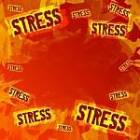Survival Stress - You may have heard the phrase "fight or flight" before. This is a common response to danger in all people and animals. When you are afraid that someone or something may physically hurt you, your body naturally responds with a burst of energy so that you will be better able to survive the dangerous situation (fight) or escape it all together (flight).
Internal Stress - Have you ever caught yourself worrying about things you can do nothing about or
 worrying for no reason at all? This is internal stress and it is one of the most important kinds of stress to understand and manage. Internal stress is when people make themselves stressed. This often happens when we worry about things we can't control or put ourselves in situations we know will cause us stress. Some people become addicted to the kind of hurried, tense, lifestyle that results from being under stress. They even look for stressful situations and feel stress about things that aren't stressful.
worrying for no reason at all? This is internal stress and it is one of the most important kinds of stress to understand and manage. Internal stress is when people make themselves stressed. This often happens when we worry about things we can't control or put ourselves in situations we know will cause us stress. Some people become addicted to the kind of hurried, tense, lifestyle that results from being under stress. They even look for stressful situations and feel stress about things that aren't stressful.Environmental Stress - This is a response to things around you that cause stress, such as noise, crowding, and pressure from work or family. Identifying these environmental stresses and learning to avoid them or deal with them will help lower your stress level.
Fatigue and Overwork - This kind of stress builds up over a long time and can take a hard toll on your body. It can be caused by working too much or too hard at your job(s), school, or home. It can also be caused by not knowing how to manage your time well or how to take time out for rest and relaxation. This can be one of the hardest kinds of stress to avoid because many people feel this is out of their control.
The effects of chronic stress
The body doesn’t distinguish between physical and psychological threats. Whether you're stressed over a busy schedule, an argument with a friend, a traffic jam, or a mountain of bills, your body reacts just as strongly as if you were facing a life-or-death situation. If you have a lot of responsibilities and worries, your emergency stress response may be “on” most of the time. The more your body's stress system is activated, the easier it is to trip and the harder it is to shut off.
Long-term exposure to stress can lead to serious health problems. Chronic stress disrupts nearly every system in your body.
- It can raise blood pressure
- It can suppress the immune system
- It can increase the risk of heart attack and stroke
- It can contribute to infertility
- It can speed up the aging process.
- It can leave you more vulnerable to anxiety and depression.
Since internal stress is a normal reaction to your worrying or stewing over mostly negative issues, does it make sense that having a good way to control how you think about negative issues would be beneficial to you?
That's what we offer you through Finding Personal Peace. Controlling the negative thinking that results in stress could make you a much happier person.
Think about it.
P.S. When you’re done thinking, click here for more information.






